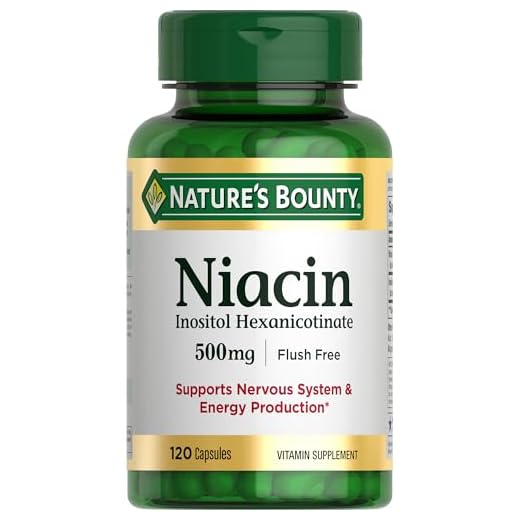







Vitamin B3, or niacin, can indeed help improve cognitive function. It's crucial for synthesizing NAD and NADP, which are key for energy metabolism and brain health. Studies show that higher dietary niacin intake leads to better cognitive test scores and can enhance neurotransmitter production, positively affecting memory and performance. A deficiency in niacin is linked to cognitive decline and mood disorders, while supplementation may alleviate symptoms of anxiety and depression. To better understand how to incorporate niacin into your diet or supplementation routine, consider the latest findings on this essential nutrient's role in mental health.
Key Takeaways
- Niacin, or Vitamin B3, is essential for synthesizing NAD and NADP, which are crucial for brain energy metabolism.
- Higher dietary intake of niacin correlates with better cognitive performance and improved test scores.
- Adequate niacin levels support neurotransmitter production, positively affecting memory and cognitive function.
- Niacin deficiency is linked to cognitive decline, mood disorders, and symptoms of depression and anxiety.
- Supplementing niacin may alleviate mental health issues and enhance overall cognitive function.
Understanding Niacin
When it comes to understanding niacin, it is essential to recognize its dual forms: nicotinic acid and niacinamide. Both forms of vitamin B3 are significant for synthesizing coenzymes NAD and NADP, which catalyze over 400 biochemical reactions in your body. Niacin plays a fundamental role in energy metabolism, converting food into energy and supporting cellular functions. This process is particularly important for maintaining ideal brain health. Additionally, niacin is known to support cardiovascular health and promote healthy skin, making it a versatile nutrient in your overall well-being. The Source Naturals Niacin supplement provides a reliable option for those looking to enhance their niacin intake effectively.
The recommended daily allowance (RDA) for niacin is typically 14-16 mg for adults. Adequate dietary intake is significant, as deficiencies can lead to cognitive decline and psychiatric symptoms. Niacin directly influences neurotransmitter production, impacting memory and cognitive performance.
To support your cognitive function, you should focus on incorporating niacin-rich foods into your diet. Poultry, fish, and legumes are excellent sources that help maintain appropriate levels of this essential vitamin. By ensuring you meet the RDA for niacin, you can help safeguard against cognitive issues and support overall brain health. Understanding niacin's role in energy metabolism and neurotransmitter production underscores its importance in your daily nutrition.
Niacin's Role in Cognitive Function
Niacin's impact on cognitive function is significant, particularly due to its role in synthesizing NAD and NADP, which are essential for energy metabolism and brain health. These coenzymes are involved in over 400 biochemical reactions, many of which relate directly to cognitive processes. Higher dietary niacin intake correlates with improved cognitive test scores and a marked reduction in the risk of cognitive impairment among older adults, as evidenced by data from the National Health and Nutrition Examination Survey (NHANES). Additionally, studies suggest that adequate niacin levels can enhance overall well-being and energy metabolism, which are fundamental for maintaining focus and mental clarity supporting overall well-being.
Furthermore, niacin influences neurotransmitter production and regulates brain chemicals essential for mental health. This regulation enhances memory, problem-solving capabilities, and overall cognitive performance. Conversely, niacin deficiency can lead to cognitive decline and mood disorders, underscoring its important role in maintaining brain health and preventing neurodegenerative diseases.
Furthermore, niacin supplementation has shown promise in alleviating symptoms of depression and anxiety, reinforcing its significance in promoting cognitive well-being. By ensuring adequate niacin levels, you can support your cognitive function and mental health, highlighting the nutrient's indispensable role in your brain's health and longevity.
Food Sources of Niacin
A variety of food sources can help you maintain adequate levels of niacin, or vitamin B3, which is essential for cognitive health. Poultry, such as grilled chicken breast, is a standout option, providing about 64% of the Recommended Daily Value (DV) for niacin in just one serving. Fish, beef, and legumes also serve as excellent dietary sources, ensuring you receive enough niacin to support ideal cognitive function. Additionally, incorporating niacin-rich supplements like Nutricost Niacin 500mg can further enhance your intake if dietary sources are insufficient.
Whole grains are another beneficial source of niacin; however, it is significant to recognize that their bioavailability may be reduced due to complex formation. Utilizing alkali treatment can enhance niacin absorption from these grains, making them a more effective option in your diet.
The Recommended Dietary Allowance (RDA) for niacin is set at 16 mg/day for men and 14 mg/day for women, underscoring the need to incorporate niacin-rich foods into your daily nutrition. While nutritional supplements containing niacin are available, it is vital to consult a healthcare professional before using them, as high doses can lead to side effects. Focus on obtaining niacin from natural food sources to support your cognitive health effectively.
Niacin Supplementation Considerations
Many individuals consider niacin supplementation as a means to enhance cognitive function, particularly as research highlights its role in supporting neurotransmitter production and overall brain health. Studies indicate that higher dietary niacin intake considerably reduces the risk of cognitive impairment, making niacin supplementation an appealing option for those concerned about cognitive decline.
However, before starting any supplementation, it's important to consult with healthcare providers. They can help you determine ideal dosages tailored to your specific needs. While niacin can offer cognitive benefits, especially for aging populations, there's a risk of potential side effects if intake isn't balanced. For instance, excessive niacin can lead to flushing, gastrointestinal distress, or even liver toxicity.
It's also vital to recognize that niacin deficiency is linked to cognitive decline and mood disorders. By addressing this deficiency through supplementation, you may improve not only cognitive function but also overall mental health. As ongoing research explores the long-term effects and ideal dosages of niacin supplementation, staying informed will empower you to make the best decisions for your brain health. Always keep your healthcare provider in the loop to guarantee a safe and effective approach to niacin supplementation.
Niacin and Mental Health
Often overlooked, niacin plays an essential role in mental health, with deficiencies linked to symptoms of depression and anxiety. Research indicates that adequate levels of niacin can considerably influence your cognitive function by aiding in the production of neurotransmitters. These neurotransmitters are critical for memory retention and emotional regulation, which are fundamental for maintaining mental well-being.
Supplementation of niacin has shown promise in potentially improving mood and alleviating various mental health issues. This suggests its role in psychiatric treatment, particularly for conditions like schizophrenia and bipolar disorder, where inflammation in the brain can exacerbate symptoms. By reducing this inflammation, niacin may help mitigate some of the psychiatric challenges associated with these disorders.
Additionally, ongoing studies suggest that niacin possesses neuroprotective effects, potentially safeguarding cognitive function and protecting against cognitive decline as you age. As you consider your mental health strategies, it's important to recognize niacin's multifaceted benefits. Ensuring adequate niacin intake might not only bolster your mood but also support overall cognitive health, making it a key player in your mental wellness toolkit.
Conclusion
So, if you're hoping for a magic pill to boost your brainpower, niacin might not be your golden ticket. Sure, it plays a role in cognitive function—like a supporting actor in a blockbuster—but don't expect it to rewrite the script of your intellect. Eating a balanced diet rich in niacin can help, but remember, no one's handing out Nobel Prizes for just taking supplements. It's about lifestyle, not just vitamins, so keep that brain of yours engaged!




